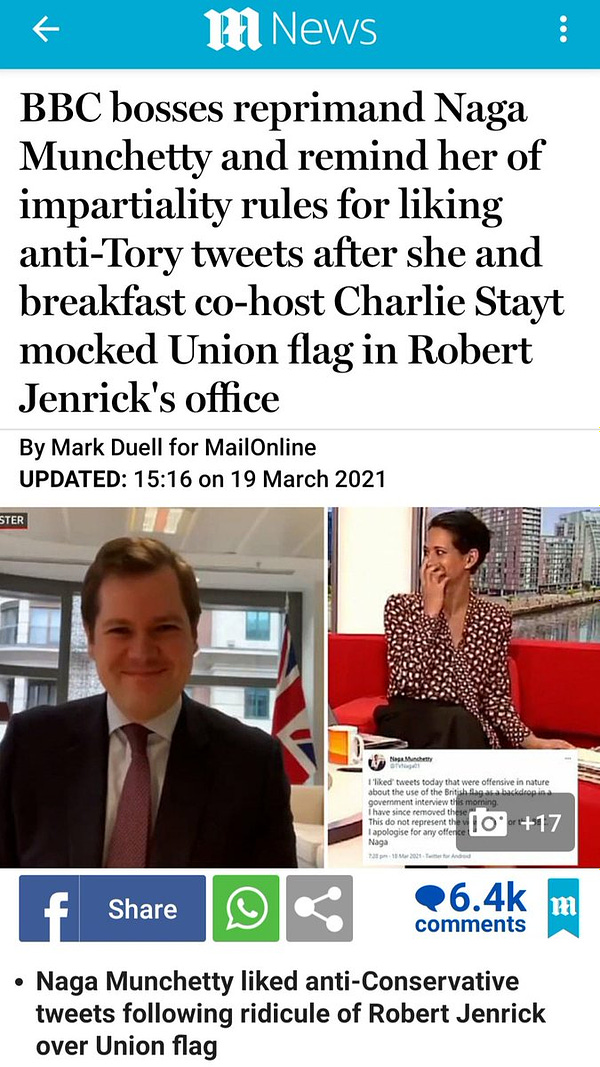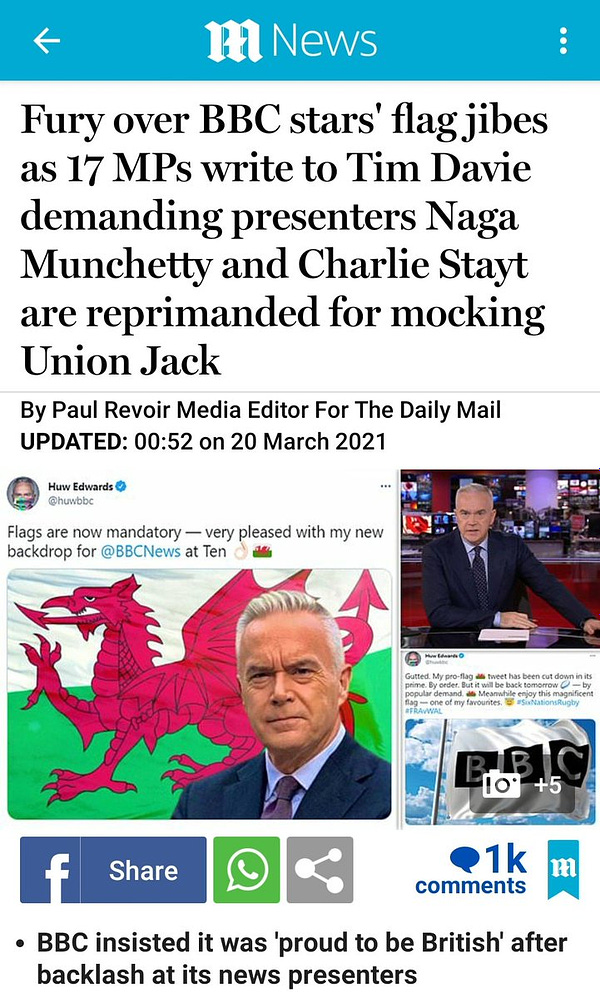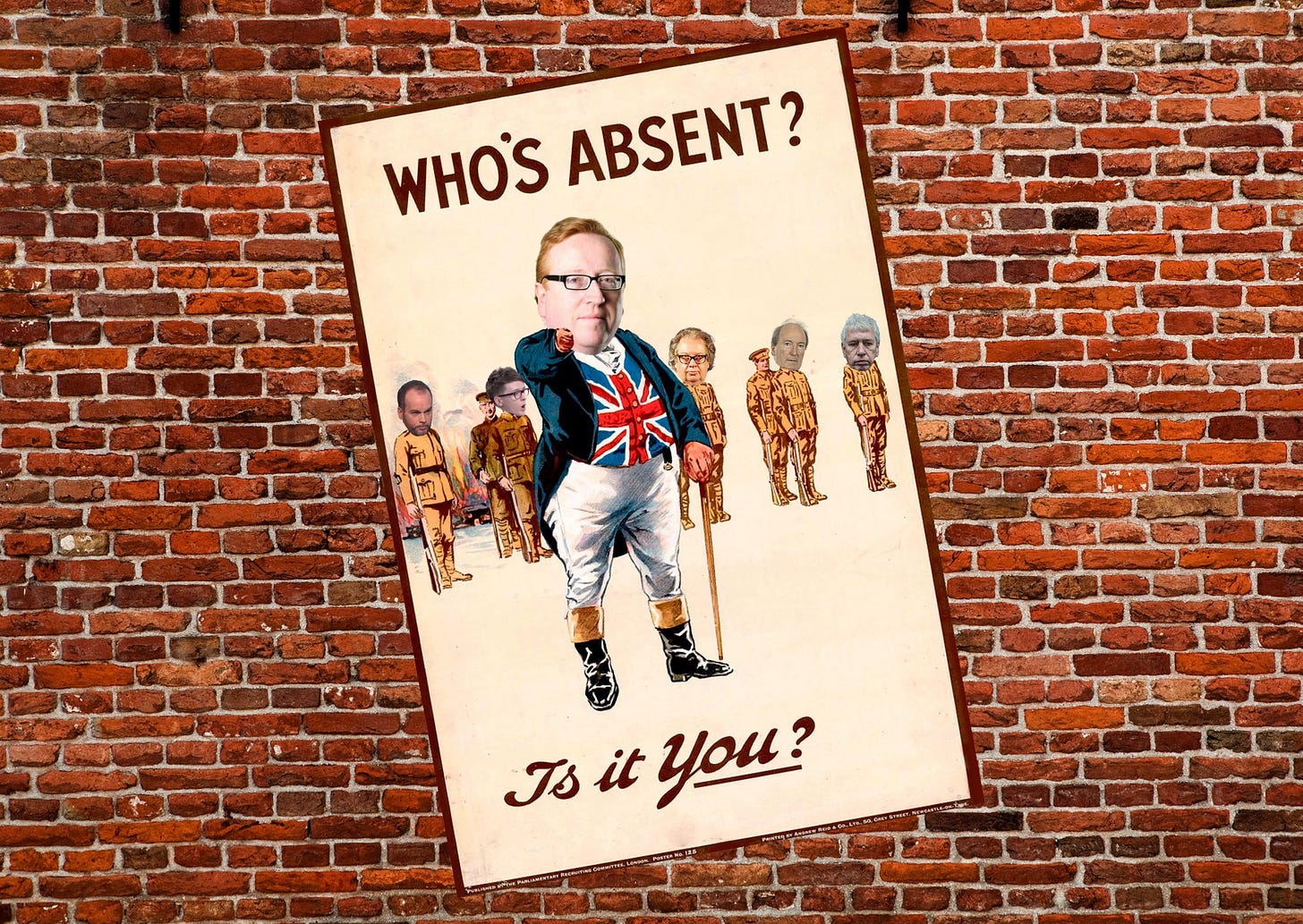A message from John Bullshit: Right-wing columnists are the ones who really hate Britain.
And it's all because they so desperately want a return to a 1950s vision that never actually existed.
Right-wingers in America have long fetishised their flag, with debates about the need for laws to criminalise burning it a frequent fixture of public discourse. And, in Northern Ireland, flags are everywhere — a constant symbol of old enmities and current loyalties. But in the 80s in England, the Union Flag tended to be tarted about by the National Front and other far-right groups. By the 90s, it had become another bit of Blairite branding, something for Britpop bands to have emblazoned on their guitars and Geri Halliwell to wear as a dress.
The current flag escalation, where ministers compete to fill their interview backdrops with ever more and ever bigger Union Flags, preferably alongside a big bold picture of the Queen, is all part of the confected culture war. The inevitable conclusion to this trend will be Sir Keir Starmer appearing on television in a suit made of flags, with his face painted with the flag, prompting an avalanche of comment pieces wondering if he’s patriotic enough.
Plenty of people had noticed the silliness of the lumpen symbolism deployed by ministers before Charlie Stayt joked about Robert Jenrick’s flag this week.
But the right-wing columnists who have assured us for years that it is the left that can’t take a joke and demands firings for innocuous comments have been boiling over. They’re particularly excited because Naga Munchetty, who was co-presenting with Stayt, joined in with the joke and later unwisely liked a few tweets about the comments. The dog whistles were ringing out even as Munchetty tweeted an apology.




Simon Heffer — Beaker from The Muppets if he’d been brought up on a steady diet of Enoch Powell and Friedrich Hayek — delivered a Telegraph column straight out of the now hackneyed culture war playbook. Under the headline
The BBC must stop employing those who despise their own country, he writes:
Sadly it will shock or surprise no-one that two BBC Breakfast presenters should find the display of the Union flag and a picture of Her Majesty the Queen in the office of a cabinet minister to be a suitable subject for mockery.
That one line tells you everything about the modern right’s view of free speech. It is not that they want to defend the right to free speech, but the freedom of right speech; in government and in the press, their aim to reduce the range of permissible views while pretending that the left are the ones driving censorship.
There is no reason the Queen — a woman whose power stems from emerging from a magic vagina — should be exempt from ridicule. And the fetishisation of the flag doesn’t represent a defence of so-called British values, but the degradation of them. If British freedom means a mandatory requirement to salute the flag and genuflect to the state in a manner defined by people like Heffer then it is no kind of freedom at all.
Unsurprisingly, Heffer mentions Charlie Stayt just once and focuses his ire on Munchetty. Her name also appears in the tags for the story online, while Stayt’s does not. What possible connection could his focus have to the framing in the headline about people who “despise their own country”? Could it be that it’s easier for Heffer to demonise and other a British woman of Indian and Mauritanian heritage than it is for him to take potshots at a white man?
Qwhite difficult to say for sure…
But I’m perfectly willing to guess at Heffer’s motivations since he imagines himself qualified to rule on the contents of Naga Munchetty’s thoughts. He continues:
Ms Munchetty appears to think her status gives her the right to behave in a way that few of her better-disciplined colleagues would dare. After her co-presenter ridiculed Mr Jenrick’s flag she tweeted that he would have upset the "flag shaggers".
The BBC later reminded her of her responsibilities – a nice phrase – about social media use. She later admitted to having liked tweets that were "offensive in nature"; she removed the "likes" and said they had not represented "the views of me or the BBC. I apologise for any offence taken." She is clearly a highly intelligent woman, so if her "likes" did not represent her views, what on earth did she post them for?
And as for the apology: one does not wish to imitate Piers Morgan, but how on earth can anyone believe it?
As is so often the case at the modern Daily Telegraph where sub-editors have been largely dispensed with and ideology trumps all, Heffer — he of the endless style guides and books on ‘correct’ English — has got his facts wrong. Munchetty did not tweet that Stayt had upset “flag shaggers”. She liked a tweet that contained that assertion and apologised for doing so.
Heffer does not accept Munchetty’s apology but he also cannot accept the facts around the incident nor the notion that sometimes a joke is just a joke. But that’s because The Telegraph line is that anyone who suggests that Britain might have a racist history (and present) must hate the country.
The final paragraph of Heffer’s column brings things back round to his and his paper’s real intention:
I suspect now [Tim Davie] is finding dealing with that cultural problem far harder than he imagined. He needs to wrest back control, and his latest proposals just aren’t enough. Otherwise, all that will remain to be seen is whether the Government manages to start the inevitable dismantling of the BBC before almost everyone has stopped watching it.
Heffer knows his readers will detect exactly what he means when he says “cultural problem” and his opportunism is writ large — Stayt’s joke just gave The Telegraph another chance to call for the BBC to be abolished. It finds an excuse to make that case every other day anyway.
And, as if by magic, the day after Heffer’s column was published, his colleague Sherelle Jacobs filed her version of the same riff, incorporating the old tune that Labour is screwed unless it gets a lot more racist, I mean, patriotic…

Echoing Heffer, Jacobs begins her column — The BBC and Labour don’t understand British patriotism — by questioning how anyone could joke about the flag or patriotism:
What is so funny about patriotism? The Union flag, God Save the Queen, the Royal family, the Armed Forces: the majority of us don’t embrace the emblems of nationhood out of overweening pride, or because we think we are better than anyone else, or we lust after an imaginary past in which Britannia Ruled The Waves. It’s just that patriotism is normal, as humdrum as crotchety March weather or a morning cup of tea.
This is another attempt to claim something is terribly ‘normal’ when it isn't really. Most ‘normal’ people — whatever the fuck that means — don’t fly the flag on the top of their house or even own a flag for that matter. Most people don’t think about patriotism or what it means to be patriotic until a pollster, a politician, or a particularly red-faced columnist raises the question.
For many people, I’d hazard a guess that it’s most people actually, nationality is something they’re occasionally proud of but which they usually realise is an accident of birth, a location-based lottery win. But that way of looking at things doesn’t work for culture warriors like Heffer and Jacobs.
Jacobs’ column continues:
At the more extreme fringes of the Left, the Union Jack is a badge of imperialism and demagoguery. (In contrast with the EU flag, which they stick on their bumpers.) British history is one crime after another, and British people should be ashamed of themselves.
Again, that’s an attempt to frame all dissent about the flag and what it represents as the preserve of extremists. But there are millions of people all over the world, in 178 countries that Britain invaded (and probably in the 22 it never did) who do not see the Union Flag as a friendly sign or a cheeky symbol of ‘Cool Britannia’.
When Jacobs writes dismissively of people who believe “British history [being] one crime after another”, she’s so close to getting the idea. Does it mean that everyone who happens to have been born British should walk around in a state of permanent shame? No. But it might be quite good to recognise that bloody history rather than pretending that we are and always have been the goodies.


After a grab bag of the usual blood pressure raisers for Telegraph readers — the Labour Party, the NHS, ‘Corbynistas’ — Jacobs finally gets to her point:
If Labour and the BBC are to have any hope of understanding the way most voters think about this country, they need to know what patriotism is. Urban myths prevent them from doing so. If the intelligentsia loved this land enough to actually read its history, they would learn that its patriotism is not rooted in working-class jingoism. While quixotic public schoolboys fought in the world wars for “English fields” and liberty, farmers and manual workers were galvanised by the camaraderie of the trenches. Little England was confected by Georgian poets and Victorian bourgeois illustrators, not Tory gammons.
Again, this is not about reading history but about reading what Jacobs and her Telegraph colleagues and bosses consider the ‘right’ history.
For example, Professor Priyamvada Gopal’s Insurgent Empire: Anticolonial Resistance and British Dissent is a fine work on the history of the British Empire and the way enslaved and colonial subjects fought for their independence. But that wouldn’t count as the ‘right’ history, because it requires the reader to understand that British history is complex, messy, and brutal.
I believe that it’s right-wing columnists and reporters at papers like The Times, The Telegraph and, of course, The Daily Mail who actually hate Britain. Because what they want is an imagined Britain. A whiter, ‘politer’, more deferential Britain, a Britain in which they are once again the only people with voices that are heard.
Their dream Britain is a Tebbettian Britain of men getting on their bikes and endless village greens where cricket games last forever. They might have a favourite curry but they secretly wonder why the chef can’t ‘go home’ now we have the recipe. Their love of Britain is a partial love, a love that comes from exclusion and delusion.





Great piece again, I was wondering have you ever done any In depth analysis of the government source bottom feeders Kuenessberg and Peston? Neither should be so pro government but they appear shameless in how they parrot the messages and doff their journalistic caps